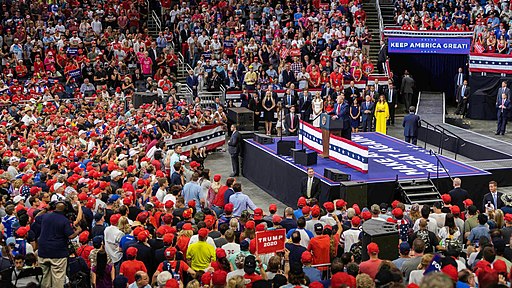
The controversy around President Donald Trump’s recent tweets targeting “The Squad” — four Democratic members of Congress who are all women, all people “of color,” and all of whom Trump seems to think aren’t “from America” (one came from Somalia as a young woman and became a US citizen at 17; the rest are “natural born” US citizens) — largely centers around perceptions of his personal bigotry.
Is Trump a racist? A xenophobe? A misogynist? His public history, going back at least to the early 1970s, offers evidence for all three accusations. Some people find that evidence compelling, some don’t.
But to focus on Trump’s personal beliefs in any of those areas is to miss the point. He’s not an individual actor living out his life in private. He’s a public actor, leading a major political party, occupying the highest political office America has to offer, and campaigning for re-election to that office.
A decade ago, I began writing on a phenomenon I call “Peckerwood Populism” (“peckerwood,” a regional version of “woodpecker,” became first a slur used by poor southern black Americans to describe poor southern white Americans, then a self-descriptor and symbol proudly used by white racists). Here’s my description of Peckerwood Populist politicians circa 2009:
“While the average Peckerwood Populist is probably not affiliated with overtly white separatist/supremacist groups, he buys into that stereotype of the voter he’s pursuing. He’s pitching his product to blue collar white voters. … I’m not saying that the average white, blue collar voter is a racist, a xenophobe, a homophobe or a neo-Confederate. For that matter, I’m not even necessarily saying that the Peckerwood Populist agitator is a racist, a xenophobe, a homophobe or a neo-Confederate. What I am saying is that the Peckerwood Populist agitator believes that … he can get his hooks into the voter by playing on those assumed sentiments.”
Sound familiar?
At one time, overt Peckerwood Populism was the mainstream in southern politics, preached by segregationist Democrats and, as it lost popularity, “Dixiecrats.” As it became even less popular and less overt and switched parties (with Nixon’s “southern strategy”), its reach expanded outside the south and loomed large in American politics until at least as late as 1988 (remember the Willie Horton ads?).
Peckerwood Populism is enjoying a nasty resurgence in the Age of Trump (and Trump is far from its sole practitioner).
Why? Because the Republican Party has failed to expand its base. The core GOP voting demographic is still white, blue collar, and male. The party has failed to appeal to black, Latinx, and female voters to expand that base.
If you can’t expand your base, you win by working harder to get more of that base out to the polls. You throw them lots and lots of red, racist, xenophobic, misogynist meat.
That’s exactly what Trump is doing. Whether he really means the crazy things he says is (mostly) beside the point. He believes his base believes those crazy things. If he’s right, that’s a far bigger problem than Trump himself.
Thomas L. Knapp (Twitter: @thomaslknapp) is director and senior news analyst at the William Lloyd Garrison Center for Libertarian Advocacy Journalism (thegarrisoncenter.org). He lives and works in north central Florida.
PUBLICATION/CITATION HISTORY
- “Peckerwood Populism is About Political Strategy, Not Personal Belief,” by Thomas L. Knapp, River Cities’ Reader (Iowa), 07/22/19
- “Peckerwood Populism is About Political Strategy, Not Personal Belief,” by Thomas L. Knapp, CounterPunch, 07/23/19
- “Peckerwood Populism is About Political Strategy, Not Personal Belief,” by Thomas L. Knapp, OpEdNews, 07/23/19
- “Peckerwood Populism is about political strategy, not personal belief,” by Thomas L. Knapp, Columbia, South Carolina Panorama, 07/25/19
- “Peckerwood Populism is About Political Strategy, Not Personal Belief,” by Thomas L. Knapp, Ventura County, California Citizens Journal, 07/27/19
- “Peckerwood Populism Is About Strategy, Not Personal Belief,” by Thomas L. Knapp, Cordell, Oklahoma Beacon, 07/30/19


